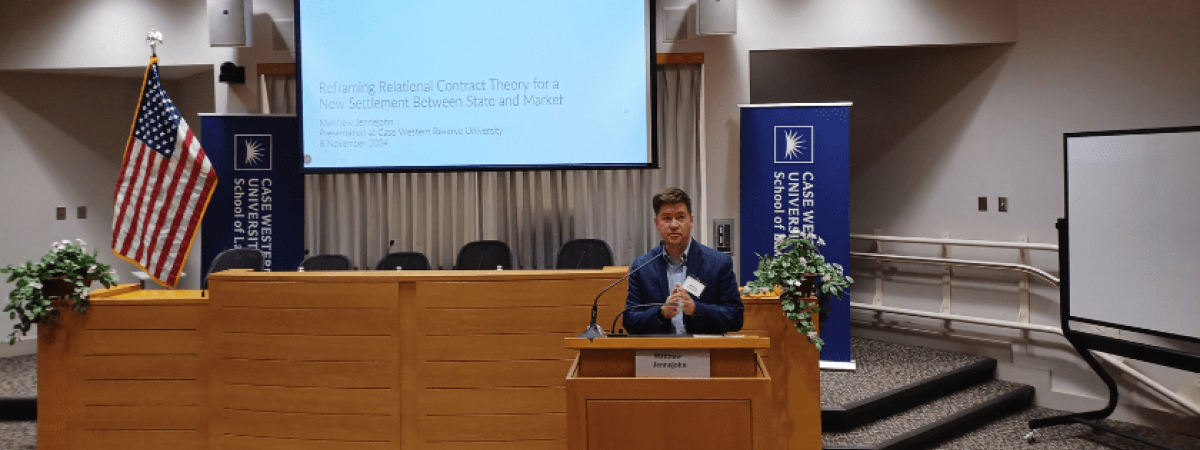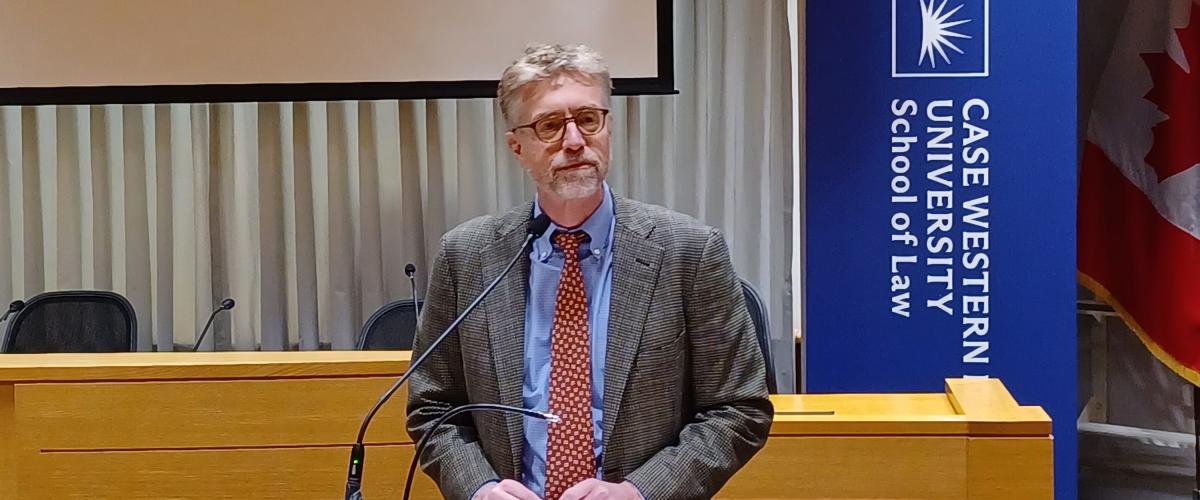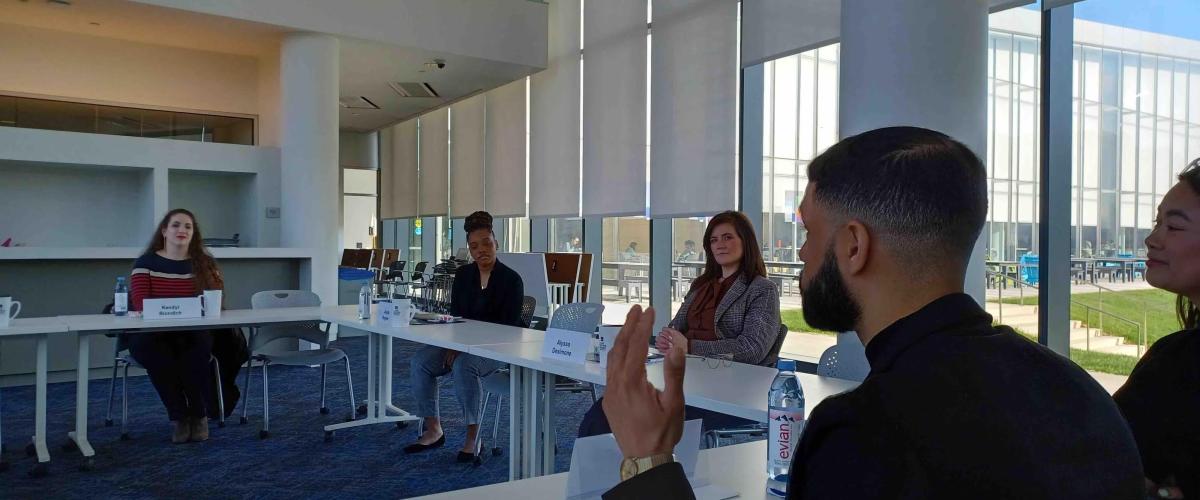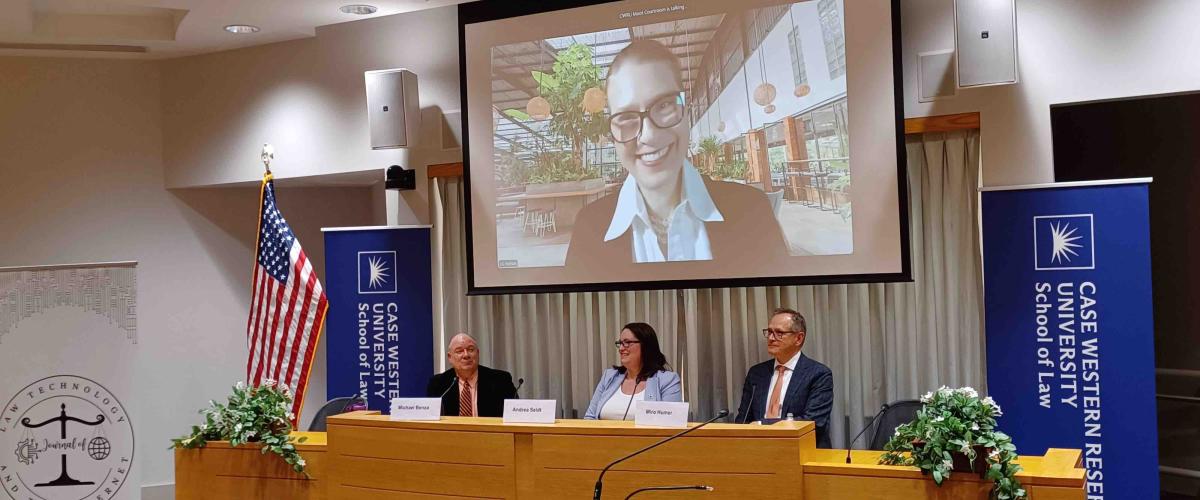On Friday, Nov. 8, the Center for Business Law hosted the George A. Leet Business Law Symposium on Relational Contracting in the New Industrial Policy. The event focused on relational contracting—which is the acknowledgement that contracts often rely heavily on trust between parties and implicit and unwritten understandings, rather than solely on the explicitly documented terms of memorialized agreements. It also explored what role relational contracting does and should play in industrial policy, i.e., the government’s efforts to shape the economy by targeting specific industries, firms or economic activities.
After open remarks by Dean Paul Rose, the event began with a keynote address from Matthew Jennejohn—the Deputy Director of Strategy in the Office of Strategic Capital at the U.S. Department of Defense, an analyst at Johns Hopkins University’s Applied Physics Laboratory, and the Marion and Rulon Earl Professor of Law at BYU Law School. His scholarship focuses on the impact of institutions on economic growth, with particular attention to “building equitable institutions for a complex economy.” His keynote address unpacked what is relational contracting and industrial policy. He then explored the interplay of these two topics within the scope of the United States economy today.
Additional panels included: Lawyers, Managers and Bureaucrats: Interdisciplinary Perspectives on Governance; Consensus Templates, Interviews from Biopharma and Relational and Contextual Aspects of Collaborations; and Technology Transfer, Biopharma and Biomedical Innovations.
The speakers on these panels included:
- Lisa Bernstein, Wilson-Dickinson Professor of Law, University of Chicago Law School
- Jorge Contreras, James T. Jensen Endowed Professor for Transactional Law and Director of the Program on Intellectual Property and Technology Law, University of Utah Law School
- Susan Helper, Frank Tracy Carlton Professor of Economics, CWRU Weatherhead School of Management
- Geerte Hessen, General Counsel and Secretary of the Board of Directors, Ferrovial
- Juliet Kostritsky, Everett D. and Eugenia S. McCurdy Professor of Contract Law and Director, Center for Business Law, CWRU School of Law
- Peter Lee, Martin Luther King Jr. Professor of Law and Director, Center for Innovation, Law, and Society, UC Davis School of Law
- John Murray, Associate General Counsel, AbbVie, Inc.
- Liza Vertinsky, Professor of Law, University of Maryland School of Law
- Josh Whitford, Associate Professor and Director of Graduate Studies, Department of Sociology, Columbia University
In commenting on the event, professor Juliet Kostritsky stated, “It is phenomenal to bring together leading voices to discuss what role relational contracting plays in industrial policy.” She continued, “the expertise of legal scholars, practitioners, economists and sociologists brought an interdisciplinary approach to this topic.” Professor Eric Chaffee noted, “Each presenter is a thought leader in their respective areas of study.” He also stated, “Relational contracting is important because it reflects the reality of how contracting actually occurs. Theory is important, but it must be shaped by a meaningful understanding of how the world actually operates.”
The George A. Leet Symposium is a biennial event that brings together leading academics, practitioners, judges, regulators and members of the public to discuss cutting-edge issues of business law. It is part of the extensive public lecture series provided by the Center and a marquee event at the School of Law.
The Center for Business law at Case Western, which is co-directed by professors Juliet P. Kostritsky and Eric C. Chaffee, is an initiative to prepare future leaders to understand business issues facing business entities, engage in research on the role and impact of government in the regulation of business and to foster public debate regarding the role of government in the regulation of businesses. It is part of the robust business law curriculum at the Law School.





